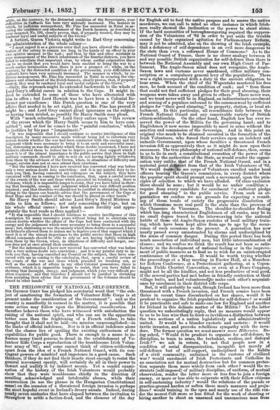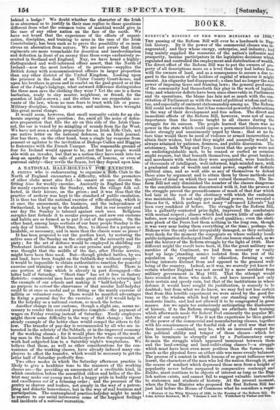THE PHILOSOPHY OF NATIONAL SELF-DEFENCE. Slit GEORGE GREY has pledged
his secretarial word that "the sub- ject of sanctioning the formation of Volunteer Rifle Corps is at present under the consideration of the Government"; and as the country is manifestly in earnest in the matter, it is possible that some action may follow upon the Ministerial consideration. It therefore behoves those who have witnessed with satisfaction the raising of the national spirit, and who can see in the apparition better uses than the frightening of a French robber, to take thought that it shall not be laid—its mission unaceomplished—in the limbo of official indolence. Nor is it in official indolence alone that the chance lies of spoiling the existing enthusiasm of its capabilities for public good. There is enough in a name to in- fluence many timid persons to dread in the establishment of Vo- huiteer Rifle Corps a reproduction of the troublesome Irish Volun- teer army of '82 ; and some cannot think of citizen-soldiership apart from the idea of a French National Guard, with its con- tingent powers of mischief and impotence in a good cause. Such thinkers, if they do not find their hearts stout enough to resist the general movement openly, will certainly do all in their power to thwart and nullify it by indirect means. Yet a candid exami- nation of the history of the Irish Volunteers would probably show that they were troublesome chiefly in the direction of assailing acknowledged and intolerable abuses, while their insurrection (to use the phrase in the Hungarian Constitutional - sense) on the occasion of a threatened foreign invasion is perhaps the most hopeful event in Ireland's dreary annals. Indeed, during nearly seven centuries that have elapsed between the invitation to Strongbow to settle a faction-feud, and the clamour of the day for English aid to feed the native paupers and to coerce the native murderers, we can call to mind no other instance in which Irish- men really showed the inclination or the power to stand alone. If the hard necessities of boroughmongering required the suppres- sion of the Volunteers of '82 in order to put aside the trouble caused by their organized agitation for Parliamentary Reform, may it not be admitted, also on the showing of the Irish example, that a deficiency of self-dependence is an evil more dangerous to the state than even a reformed House of Commons ? As to the National Guard of France, there is no closer analogy between it and any possible British organization for self-defence than there is between the National Assembly and our own High Court of Par- liament The Anglo-Saxon mind does not recognize, the Anglo- Saxon laws and customs never sanctioned, either military con- scription or a compulsory general levy of the population. There was a right incorporated with a duty in the ancient obligation to bear arms. When the chief of the Wapentake mustered his free men, he took account of the condition of each; and " from those that could not find sufficient pledges for their good abearing, their weapons were taken away and given to others." There never was, and we trust never will be in England, an indiscriminate enrolment and arming of a populace unbound to the commonweal by sufficient pledges for "their good abearing," in property, station, or local at- tachment. In this particular, all resemblance fails between the French National Guard and any conbeivable variety of British citizen-soldiership. On the other hand, English law has ever re- served the power of the Militia for the governing hand; and to Englishmen it now seems impossible to meet in arms without the sanction and commission of the Sovereign. And in this point an original vice much to be shunned occurred in the formation of the Irish Volunteers, who forced their services upon an indolent and imbecile Government, upon whose faculties a threatened French invasion fell as oppressively then as it might do now upon their successors. The true philosophy of national self-defence, then, seems to us to lie in such a constitutional evocation of the power of the Militia by the authorities of the State, as would render the organi- zation very unlike that of the French National Guard, and in a material point difftwent from that of the Irish Volunteers of '82. We would desire Ao see corps of Volunteers enrolled under local officers bearing the Queen's commission, in, every district where the popular spirit should prompt such a movement, upon the prin- ciples of selection to which we have alluded. Of class exclusion there should be none; but it would be no unfair condition; a require from every candidate for enrolment "a sufficient pledge for good obeying " in the public service. From such an or- ganization we confess we see grounds for expecting a reunit- y* of those bonds of society the progressive dissolution of which threatens more real peril to the state than the prowess of the Chasseurs de Vincennes. The shoulder-to-shoulder feeling which has long characterized Englishmen of all ranks, may be in no "small degree traced to the interweaving into the national habits of those old Anglo-Saxon ouster= of local military train- ing, which have been kept allure from age to age by the recur- rence of such occasions as the present. A generation has now nearly passed away uninstructed by alarms and undisciplined by the sense of common danger. During this period there has been much association of individual men, but little intercombination of classes; and we confess we think the result has not been so satis- factory in the development of national feeling or in the improve- ment of public manners as to lead us to wish for an uninterrupted continuance of the system. It would be worth trying whether the proceedings at a May meeting in Exeter Hall, at a Manches- ter Reform Conference, at a Protectionist gathering, at a Copen- hagen Fields Chartist Convention, or even at a Peace Congress, might not be all the kindlier, and not less productive of real good, if the several parties had met before in friendly contention at their village butts, and had volunteeredito make each other's acquaint- ance by enrolment in their district rifle corps. But, it will probably be said, though Ireland has been more than threatened with a French invasion, and French armies have been thrice in recent times disembarked on her shores, would it be prudent to organize the Irish population for self-defence ? or would it be practicable and safe to make one law for England and another for Ireland in this delicate matter of the Militia ? To the latter question we unhesitatingly reply, that no measure would appear to us to be less wise than to draw so invidious a distinction between the two sections of a nation legislatively and administratively united. It would be a blunder exoteric and esoteric : it would invite invasion, and provoke rebellious sympathy with the inva- ders. The former question we must answer more Hilfrernico. Be- ing asked, " Would it be prudent to organize for self-defence, to discipline, to train to arms, the turbulent, restless, and disloyal Irish ? " we ask in return, Is not thatpeople now in a condition of social disorganization, incapable not merely of self-defence but of self-support, undisciplined in the habits of a- civil community, untrained in the customs of civilized war? would enrolment of Irish Protestants and Catholics in an association not for mutual destruction but for common protec- tion separate them more widely from each other ? would the re- straints (self-imposed) of military discipline, of uniform, of mutual observation, render the latter more or less free tojoin a foreign enemy, or more or less able to cooperate with.their fellow citizens in self-sustaining industry ? would the relations of the parade or practice-ground n or soften these men's manners and preju- dices? would training in the open and manly use of the rifle ren- der the merest Celt more or less fitted for the work of shooting or hiring another to shoot an unarmed and unconscious man from behind a hedge ? We doubt whether the character of the Irish is so abnormal as to justify in their ease replies to these questions different from what the common voice of mankind would give in the case of any other nation on the face of the earth. We have not heard that the experience of the effects of organi- zation, discipline, and training to arms in the case of the Irish Constabulary, has been such as to prove the possibility of so mon- strous an aberration from nature. We are not aware that Irish regiments are more remarkable for desertion and insubordination and defection in front of an enemy than those corps exclusively re- cruited in Scotland and England. Nay, we have heard a highly- distinguished and well-informed offieer assert, that the North of Ireland—now the most lawless of its provinces—supplies the British Army with noncommissioned officers in larger proportion than any other district of the United Kingdom. Looking upon the prisoner in the dock of an Ulster County Court-house, and upon his brothers in green and in scarlet on the gaol-guard or at the door of the Judge's lodgings, what outward difference distinguishes the three men save the clothing they wear P Yet the one is a fierce barbarian, ready to slay master, neighbour, or friend, for the guerdon of half-a-crown ; and the other two are respectable ser- vants of the law, whom no man fears to trust with life or purse. Military discipline, training in arms, and uniform, have wrought this great moral change.
It would seem, however, that small necessity exists for an ela- borate arguing of this question ; for, amid all the noise of defen- sive preparation that fills the air on this side of the Irish Chan- nel, the ear is vexed by no mingling of sounds from the far West. We have not seen a single proposition for an Irish Rifle Club, not one native letter on the national defences, in an Irish journaL Nor has there, on the other hand, been a single lay response from peasant or agitator to the invitation of Bishops Cullen and Higgins to fraternize with the French Usurper. The reasonable ground of fear for Ireland would appear to be, not that her people would side with an invader, but that as a nation they have sunk into too deep an apathy for the calls of patriotism, of honour, or even of personal safety—they revile the Saxon, but they depend upon him.



























 Previous page
Previous page